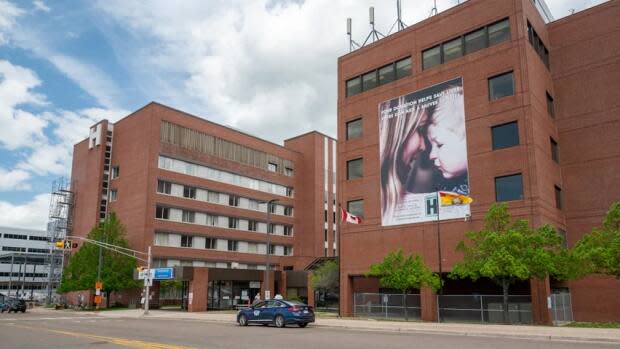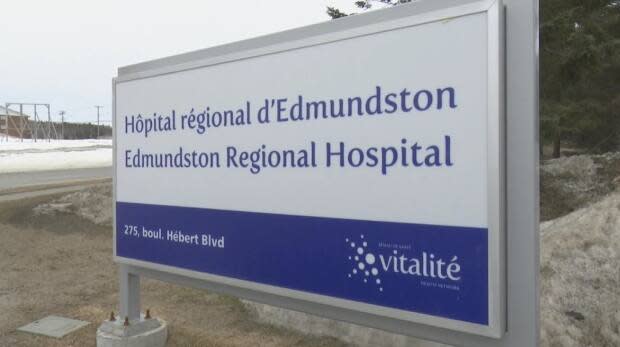No decision on inquests into 2 other ER waiting room deaths

New Brunswick hasn't decided whether to hold coroner's inquests into two emergency department waiting room deaths that occurred last year, but the family of Darrell Mesheau is relieved the circumstances of his death will be examined by an inquest jury in Fredericton next week.
The Office of the Chief Coroner announced Tuesday an inquest into the death of Mesheau, 78, who died while waiting for care at the Dr. Everett Chalmers Regional Hospital's emergency department on July 12, 2022.
His death prompted a major shakeup of New Brunswick's health-care leadership. Premier Blaine Higgs fired Horizon president and CEO John Dornan, dropped Dorothy Shephard as health minister, replacing her with Bruce Fitch, and removed the boards of both Horizon and Vitalité, installing a trustee for each health network instead.
About four months later, on Nov. 22, a man died at the Moncton Hospital's ER waiting for care. The husband and father of five allegedly told staff numerous times he believed he was dying and ultimately did die after waiting some six hours to see a doctor or nurse.
Fifteen days later, on Dec. 7, a man in his 70s died in the waiting room of the Edmundston Regional Hospital's ER.
'Necessary in the public interest'
"No decisions have been made regarding [inquests into] other emergency department deaths at this time," Department of Justice and Public Safety spokesperson Judy Désalliers told CBC on behalf of the Office of the Chief Coroner.
In Mesheau's case, the chief coroner decided an inquest is "necessary in the public interest," based on an investigation, she said.
"Except in those cases in which an inquest is mandatory under the Coroner's Act, every inquest is ordered on that same basis," Désalliers said in an emailed statement.
We hope that the resulting recommendations will create positive change for all New Brunswickers so that a tragedy such as this will not happen again. - Darrell Mesheau's family
Mesheau's family is pleased the chief coroner has determined an inquest into his death is justified.
Members of the family met this week with the coroners and the Crown prosecutors involved with the inquest and "trusts them and the process," according to a written statement provided to CBC on Wednesday.
"We hope that the resulting recommendations will create positive change for all New Brunswickers so that a tragedy such as this will not happen again," the statement says.
The inquest will be held May 29 through June 2 at the University of New Brunswick law School in Fredericton.
The presiding coroner and a jury will publicly hear evidence from witnesses to determine the facts surrounding Mesheau's death. The jury will have an opportunity to make recommendations aimed at preventing deaths under similar circumstances.
Moncton ER was in 'critical overcapacity state'
The Moncton ER patient's death prompted a rally outside the hospital. The former kidney transplant patient, identified by members of the Moncton Muslim Association with his family's permission by the initials MS only, to protect their privacy, had undergone a medical procedure a few days earlier. He was instructed to return to the ER immediately if he had back or chest pain, according to the association.
MS went to the ER the next day with severe back and chest pain and was told to take a seat in the waiting room at around 10 p.m. He had some scans done shortly before midnight, but was sent back to the waiting room, the group said.
By 3:30 a.m., he was dead.
Horizon Health Network previously told CBC the ER was "in a critical overcapacity state" at the time.
The patient had a "serious health concern" and was "triaged appropriately as an emergency priority," according to Dr. Serge Melanson, Horizon's clinical lead of emergency services.

But the patient was placed in the main waiting room "until a suitable exam space was available."
The patient was being monitored and some tests were conducted, "however the patient's condition quickly deteriorated," Melanson had said.
Edmundston ER had high traffic, long waits
In the Edmundston case, Vitalité Health Network has said the ER had a "high level of traffic and long wait times" at the time of the patient's death, but "no cause-and-effect relationship" had been established.
The patient was triaged, monitored and cared for according to established protocols, Dr. France Desrosiers, president and chief executive officer, said in a statement at the time.
His condition was deemed stable during triage, she said.

Another Edmundston ER patient "lost their life under unforeseeable and exceptional circumstances" on July 24, the network said.
Vitalité said at the time it could not release more information in that case but that staffing levels and wait times were normal, and triage processes were completed properly.
The circumstances were much different from the Fredericton ER patient's death, according to Health Minister Bruce Fitch, but he did not say how.
An inquest is a formal court proceeding that allows for the public presentation of all evidence relating to a death. The New Brunswick Coroner Service is an independent fact-finding agency that does not make any finding of legal responsibility.


